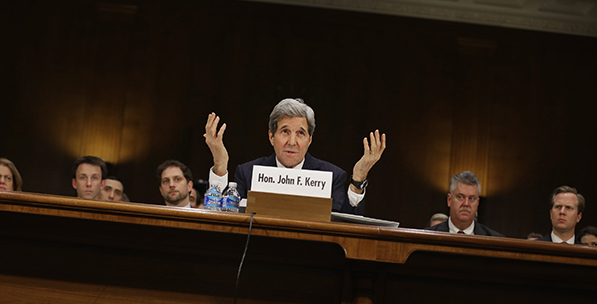It is nowadays difficult to follow U.S. foreign policy and understand the message that it is giving to the world about its direction, goals and aims – and for the followers of recent debates on "credibility addiction," yes, it is increasingly damaging both credibility and confidence in America's judgment After almost four years of puzzling inconsistencies, "red lines," ambiguities and U-turns, now according to a report in the New York Times, the U.S. is signaling some shifts in its policies toward the Syrian civil war and is underscoring a "retreat from its demand that the country's president, Bashar Assad, step down immediately." It is still not clear if there is a real change in the policy of the administration, which was launched by a statement by President Obama in August 2011. It is obvious that President Obama avoided saying anything negative about the Assad regime and instead focused on his ISIS strategy in Syria in his State of Union Speech last week.
Reports about the changing position of Obama's administration quote Secretary Kerry as the most significant evidence of their argument. Answering a question from journalists, Secretary of State John Kerry last week said, "It is time for President Assad, the Assad regime, to put their people first and to think about the consequences of their actions, which are attracting more and more terrorists to Syria, basically because of their efforts to remove Assad." Secretary Kerry did not mention the brutality of the Assad regime or its loss of legitimacy and obviously did not say anything about the impossibility of a solution with Assad.
Under these circumstances and while waiting for a reaction from the administration in regards to these reports, it may be a good idea to remember previous comments and statements by Secretary Kerry in regards to the Syrian civil war and Bashar al-Assad. Secretary Kerry was a significant actor in U.S. policy towards Syria even before becoming Secretary of State, and during his tenure he demonstrated a firm approach about Syria. Senator Kerry in the first months of the Syrian conflict approximately 44 months ago, after being criticized for his earlier position about the Assad regime stated: "I said there were a series of things that if he (Assad) engaged in them, there was a chance he would be able to produce a different paradigm. But he didn't. The chance was lost and that's the end of it." In fact, as many other actors, he also changed his position and demanded that Assad step down following the regime's atrocities in city centers and its unwillingness to reform. A few months after this statement, the administration also pronounced a similar position about the regime and asked Assad to step down.
After becoming Secretary of State, Mr.Kerry made his first overseas trip to the United Kingdom in February 2013, and Syria was one of the main topics on the agenda of his meeting with his British counterpart. In the joint press conference, after condemning the brutality of the regime, Kerry said for a viable solution in Syria "Assad has to go." In May 2013, this time in a press conference with his Jordanian counterpart , Secretary Kerry underlined that Assad is not part of their plan for the future of Syria. He stressed that they are working to create "a transition government by mutual consent of both sides, which clearly means that in our judgment President Assad will not be a component of that transitional government."
The Obama administration's "red line" about the Syrian conflict was violated by Assad in August 2013. After chemical attacks by regime forces, Secretary Kerry made a passionate speech after the release of the intelligence reports, and in this speech he called Assad, a thug and a murderer. He also underlined the responsibility of the world when it faced such transgressions of humanitarian values and international norms. Kerry in his remarks stated, ""It matters because if we choose to live in the world where a thug and a murderer like Bashar Assad can gas thousands of his own people with impunit









